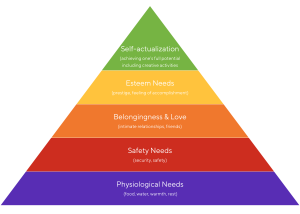Personal growth is important, but it’s not always easy to find the time and motivation for it. It can be hard to know where to start or how to identify the areas that need improvement. Taking the HIGH5 strengths assessment can provide valuable insight into your unique strengths and areas for growth, allowing you to create a personalized development plan tailored to your needs. By understanding and leveraging your strengths, you can unlock your full potential and achieve sustainable personal growth.
In this article, we’ve got you covered with our advice on how to grow as an individual through personal growth and development. We will discuss some of the benefits of personal growth and why it’s important for your development. More importantly, we’ll speak about how to make it happen.
What is personal growth?
Personal growth is the act of developing as an individual. The term can be used to describe personal development in several areas, including mental, physical, and emotional health. These areas are often interlinked, and the ultimate aim of each personal growth goal will be to enrich all areas of your life. A great starting point for personal growth is taking the HIGH5 strengths assessment. By identifying your unique strengths, you can gain valuable insights into your natural talents and inclinations, allowing you to focus your growth efforts on areas that align with your strengths while also addressing potential blind spots.
This strengths-based approach can help you achieve more sustainable and meaningful personal growth. Personal growth will help you become a better individual and benefit your health and well-being in many ways. It’s also useful in many aspects of your life, including your career or business, relationships, and much more.

A personal growth journey is not easy – it takes time and effort to improve yourself in the ways that you desire. The first step on this journey is to establish the reasons why you want to improve yourself. Do you wish to better your work performance? Do you want to be more social and develop closer personal relationships? Do you want to lose weight or live a healthier life? Spend more time on hobbies, make more time to travel, or save more money? Or do you simply wish to boost your confidence and self-image, and become the best version of yourself?
Examining your reasons for wanting to grow as an individual will help you stay motivated throughout the journey and throughout your life. If you are having trouble with motivation, two useful tips are to focus on what’s important to you and use the S.M.A.R.T. method for goal setting. It is important to focus on on what you enjoy about your life as a whole, rather than just looking at the improvements that can be made within it.
This will help you stay motivated in the long run. The activities you enjoy in your life could also be used as a tool to help you on your way to personal growth. For instance, if you wish to improve your creativity in the workplace, and one of your hobbies involves creating art – drawing, painting, writing, photography – consider how you can express your abilities in other situations as well, and utilize them in e.g. team projects or problem-solving processes.
Or if your growth goal is to become more confident at work, and one of the activities you enjoy the most is spending time with your friends at pubs or concerts, try to use these opportunities to talk to new people, thereby challenging yourself to boost your confidence in general. Developing yourself as an individual will improve all areas of your life – even if it’s not always easy to see how. The benefits, however, are plentiful, so it’s well worth making the effort.
Why is personal growth important for us?
People who work on self-development are more likely to be successful both in their careers and their personal lives than someone who isn’t actively working on themselves and experience many benefits in all areas of their lives. Here are some of them:
Increased happiness
When people grow as individuals, they tend to feel happier and more fulfilled. This can lead to a greater environment for success in work as well as higher-quality relationships.

Mindfulness
By identifying our goals and actively working on the areas in our lives we want to improve, we become more in touch with our inner selves. Practicing mindfulness – being present in the moment, and taking in your surroundings and experiences – can make you better equipped to deal with tough situations and stress. Being aware of our emotions and turning our attention to our inner lives can make us feel more confident in who we are as individuals and how we interact with the world around us. It is a great way to learn more about ourselves and uncover new insights that can be applied in our daily lives.
Increased confidence
Confidence is often a bonus of personal development, which can lead you o become a more successful person in all aspects of your life. Once your confidence is boosted, you may find that personal growth is easier than before since it’s no longer scary or new territory.
Pro Tip From HIGH5
Leverage your strengths, identified by HIGH5, to amplify the benefits of personal growth. For example, if one of your strengths is Storyteller, focus on developing active listening and rapport-building skills to enhance your relationships. If you possess Analyst strengths, apply them to improve decision-making and problem-solving abilities.
Less stress
It’s a known fact that stress is bad for our health. Chronic stress can put you at risk for a range of physical and mental health problems, including anxiety, depression, digestive issues, headaches, muscle tension and pain, heart disease, heart attack, high blood pressure, stroke, sleep problems, weight gain, and memory and concentration impairment [1].
So naturally, this is something we should practice avoiding. Constantly worrying about all the little things in life can make them harder to deal with. Try to focus on completing one task at a time, follow the plans you establish, and don’t set your goals so high that they become unrealistic to achieve. If you make sure to take care of yourself, take breaks, and do the things you enjoy while you work on accomplishing your goals, it will help reduce the stress in your everyday life.
Improved health
If you’re working hard to achieve your goals, then it will become easier for you to continue to exercise or engage in healthy activities The more you stay focused on your goal and stick to your plan, the easier it will become. Once you see the progress you are making, you will begin to feel more confident and motivated. This will have a positive impact on your mental health, which again affects your physical health.

Increased productivity
In an ideal world, we’d all be able to get our work done on time or ahead of schedule and then still have plenty of time for ourselves, but that is unfortunately not the case. Many people find it hard to get through all their daily tasks, have time to exercise, and set aside time for their hobbies. This can often be ascribed to a lack of self-discipline. After all, it’s easier to sit and scroll through Facebook than to complete that report for work. It’s easier to get takeout than prepare a healthy meal from scratch, and it’s much easier to turn on the TV instead of going for a run, but these are the things that make us feel like we don’t measure up.
Identifying time thieves and unproductive habits, and practicing self-control will lead you to become more effective both at work and in your free time, hence giving you more time to do the things that you enjoy and reduce the guilt you feel from wasting time. Once you start practicing better routines and get rid of your bad procrastination habits, you will find it highly rewarding.
Great success
No matter what you’re trying to accomplish, making time for yourself and working hard on achieving your goals will lead to greater success in the long term. Making time to reflect on and evaluate your past accomplishments or shortcomings makes it easier to identify the areas you need to improve, which, once you do, will lead to greater accomplishments. In her book “Skills for Success: Personal Development and Employability”, Stella Cottrell aims to help students create their own personal development program to build the skills they need to succeed in their careers, and the book provides an excellent framework for how to use self-development as a path to success [2].
Improved peace of mind
Once you’re able to see the progress that you’ve made for yourself, it’s much easier to feel confident in your abilities. In addition, knowing that hard work pays off is a very peaceful thought, and leads us all to believe that we can achieve anything we set our minds to.
Greater resilience
Those who can cope well with stress find it much easier to deal with challenges that arise both at work and in their personal lives. While there will always be stressful times in life, make sure to keep working on your personal goals to give yourself better resilience.
How to measure your personal growth?
The best way to measure personal growth and development is to keep track of the goals you have set, the plan for achieving them, and where in the process you are currently at. If your goal is to learn about a certain topic, then make sure to take notes throughout the day. If your goal is to read a new book each week, then set aside time in your calendar. To measure your personal growth, you can ask yourself practical questions such as:
- What does my diet look like and how healthy is it?
- What do I spend money on? Do I buy unnecessary things?
- When do I procrastinate?
- What do I like to do for fun, and how can I engage in these activities as often as possible?
- How long do I study or work each week when preparing for tests or exams?

Pose such questions regularly to yourself, and keep track of your answers. After a few weeks, revisit your notes and you can see just how much progress has been made.
List of 15 self-growth examples
- Listen actively: Learn to be genuine and pay attention when other people are talking or sharing their ideas. Practice active listening, ask open-ended questions, and mirror supportive body language.
- Overcome your fear: Allow yourself to be exposed to situations that you are fearful of, such as approaching new people or speaking in front of a crowd once you are comfortable with the uncertainty surrounding the situation, you can begin overcoming your fear calmly and proactively.
- Improve your body language: Body language is nonverbal communication that comprises your postures and movements. Using the right body language can help you connect with others and communicate your message more successfully. Your body language also displays your confidence, sincerity, and tenacity.
- Build rapport with others: Always keep an eye out for opportunities to connect with others. Remember to be honest and try not to be manipulative. You are learning how to interact and build relationships with others.
- Say no to procrastination: Be aware that procrastination is a behavior, not a personality trait. Because it is a behavior, you can unlearn it just as easily as you learned it. Strive to make the most out of your time and avoid procrastination at all costs.
- Wake up early: Make it a habit to start getting up early. Waking up early has numerous benefits. You can spend the early hours working on your most important tasks, engaging in your hobbies, going for a morning exercise, etc. Furthermore, early risers tend to be happier, healthier, and more productive than late risers [3].
- Master the art of conflict resolution: Conflict happens in life as long as you are dealing with humans. You cannot avoid conflict, so the goal is to hone your conflict-resolution skills. Gaining the ability to handle disagreements and disputes amicably will undoubtedly make you more successful and happier.
- Let go of the past: Holding on to your past is one of the most significant obstacles to your personal development. It is critical to stay in the present moment if you want to be happy and appreciate life.
- Make reading a habit: Nothing is more powerful than knowledge. The greatest way to obtain knowledge is to read as much as possible. You can establish the habit of reading books as it will assist you in initially learning new knowledge and insights.
- Become more resilient: Being resilient gives you the ability to overcome any adversities that may come your way. Learning to bounce back quickly from any setbacks will assist you in growing as a person and turn your weaknesses into strengths.
- Manage stress effectively: Too much stress might impact not only your physical health but also your mental and emotional well-being, and can in the worst-case scenario lead to burnout and depression. Therefore, you have to learn to deal with stress properly. There are many stress management strategies accessible nowadays. So all you need is the desire to deal with stress.
- Be open-minded: Try to be attentive and keep an open mind when you are presented with new ideas or opinions that diverge from your own. These may offer new insights that can help you on your self-growth journey and help you make more informed decisions and
- Practice mindfulness: Learning to be more mindful will help you to recognize the abundance and blessings that are already a part of your life. Instead of dwelling on the past or stressing about your future, learn to live in the now.
- Improve decision-making skills: Create a habit to become a better decision-maker. Your decisions shape your life. The better decisions you make, the more likely you will enjoy a better life.
- Develop a growth mindset: Your attitude determines who you are as a person. You must continuously strive to improve your mindset and make it more conducive for growth. A positive mental attitude can help you in achieving your goals in life.
Pro Tip From HIGH5
Identify your top strengths from the HIGH5 assessment and explore how you can apply them to the various self-growth examples listed. For instance, if you have a strength in resilience, leverage it to better manage stress and overcome limiting beliefs. If one of your strengths is discipline, use it to establish habits like waking up early or reading regularly.
What is the process of personal growth?
During the process of personal growth and development, these are some questions you can ask yourself.
What is the situation now?
Think about your current situation. How many of your goals are being accomplished? Where are you at in life? Are you happy with where you are right now or do you want to improve yourself further?
What is a reasonable timeframe?
It’s time to think about how long you’ll need to accomplish your goal. Setting a deadline can help you stay motivated to put in the right amount of effort. However, make sure your timeline is realistic to avoid unnecessary disappointment.
How do I learn about personal growth?
Be aware of how to learn more about personal growth and development. It doesn’t happen overnight, so make sure that you have the necessary resources available as you need them.
How self-growth can change your life?
In this section, we will look at two different aspects that are essential to self-growth to change your life for the better.
Personal growth often requires a change of mindset
If you want to get better at something, it’s important that your mind is in the right place. For example: if you’re taking care of children or older people and they tend to be unruly or stubborn, try approaching them with more positive reinforcement instead of being frustrated. You will experience that employing a positive communication pattern is much more effective in resolving problems than arguments or conflicts. Be aware of your actions and how they affect those around you, and aim to inspire self-growth in others as well.
How to make a personal growth plan?
Here are the steps that you need to take to make a personal growth plan:
- Find ways to improve yourself each day
- List your short-term and long-term goals that will help you grow as an individual
- Create a timeline and schedule for progressing toward your goals
- Record all progress you make towards personal growth on your daily, weekly, or monthly calendar.
- Go back over your past progress and adjust goals as needed
- Create a personal growth planner
- Work on your mindset
Pro Tip From HIGH5
As you create your personal growth plan, start by identifying your key strengths from the HIGH5 assessment. Then, align your short-term and long-term goals with those strengths, focusing on areas where you can leverage your natural talents while also addressing potential growth opportunities. This strengths-based approach will make your personal growth journey more enjoyable, sustainable, and impactful.
1. Find ways to improve yourself each day
To grow as a person, it’s important to pay attention to your needs. When you’re looking for ways to improve yourself, focus on the little things that excite you or are interesting. For example, if you like music, dance, or reading, try picking up an instrument, taking a dance class, or reading more. These small changes can lead to big improvements in your life.
2. List your short-term and long-term goals that will help you grow as an individual
To have a personal growth plan that will work for you and keep you motivated, you must have short-term goals that are easy enough to accomplish Moreover, it’s also ideal if they are challenging enough to make you feel excited and satisfied once you accomplish them.
3. Create a timeline and schedule for progressing toward your goals
- It allows you to track your progress and adjust accordingly
- You will have a clear plan of what needs to be done to accomplish all goals (big or small) and develop yourself as an individual
- Setting deadlines can help keep you from procrastinating – which is something that many people need to work on so they can reach their highest potential

4. Record all progress on your daily, weekly, or monthly calendar.
Sometimes it’s difficult to maintain the motivation needed with personal growth plans because the speed of progress may not be seen right away. So when you’re keeping track of how far you’ve come, it can help to keep a positive mindset and focus on the bigger picture.
5. Go back over your past progress and adjust goals as needed
If goals are set too high, people may get discouraged – especially if they aren’t able to reach them right away. On the other hand, if goals aren’t challenging enough, there won’t be any motivation – which is why it’s important to go back and review your goals periodically and make potential adjustments.
6. Create a personal growth planner
Many people who are working on improving themselves create a personal growth planner to help them stay on track. Use a computer or a notebook to write down your reasons, your goals, your timeframe, and your progress. . This will allow you to capture all information as well as have it organized for future reference.
7. Work on your mindset
Achieving long-term success doesn’t mean that all challenges need to be eliminated. It’s important to remember that the ability to cope with problems as they arise is what will determine how effective a person can be. So try your best not to worry if things aren’t going as planned because ultimately it means that you’ll likely miss out on great opportunities by closing yourself off from the world.
Personal growth FAQ
What are examples of personal growth?
Every person’s growth journey looks different. For instance, one individual might grow by addressing their work/life balance. They may realize they are burnt out, and decide to take more breaks and focus on their family lifeThis will improve their mental health and boost their productivity. Another person may realize they need to be more committed to work. They may start waking up early to get to work on time and start finishing projects before their due date.
What are the 5 areas of personal growth?
There are many different aspects of personal growth. . One way to regard personal growth is to divide it into five different categories. First is mental growth, which involves your mental commitment and strength. Social growth is growing your ability to effectively communicate. Spiritual growth is increasing your closeness to a deity, God, or simply your inner self. Emotional growth is developing your ability to recognize and control your emotions. Finally, physical growth is developing your ability to work beyond your limits physically.
Some individuals also break down personal growth into six stages. The first stage is social/emotional growth, which is centered around one’s feelings and ability to communicate with others. Next is intellectual growth, which is increasing one’s knowledge. After that comes moral growth, which aligns one’s actions with their morals. Psychological growth is next, and it boosts the individual’s confidence and helps them understand their mental condition. Physical growth is next, and it connects the mind with the body. Finally, spiritual growth is last, as it can be difficult to connect with a higher power or their own human spirit.
What leads to personal growth?
Personal growth takes time and effort to achieve. First of all, a person must realize the need for their journey to begin. Usually, the individual has some sort of wake-up call to inform them they are not maximizing their potential. Once the individual realizes this, they can start identifying where they have gone wrong and take steps to correct the negative behavior, this growing.
Conclusion
Throughout your life’s personal journey, you will be faced with many challenges. No challenge is the same, and it is important to acknowledge that they may take time to overcome because of how deeply personal growth affects our lives. By focusing on personal growth, you can make better choices in your life and have a better understanding of the world around you.
Related articles:
- Personal Strengths & Weaknesses Defined + List of 81 Examples of Personal Strengths
- Personal Development Goals: 43 Examples & How To Set Goals
- 7 Ways To Identify & Utilize Your Personal Strengths
- Identifying Personal Weaknesses & Managing
- How to Develop & Improve Your Personal Strengths
References:
- How stress affects your health. American Psychological Association. 2022 October 21. https://www.apa.org/topics/stress/health#:~:text=This%20can%20put%20you%20at,and%20memory%20and%20concentration%20impairment.
- Cottrell S. Skills for Success: Personal Development and Employability. 4th ed. London: Red Globe Press;2021.
- Campbell P. Will You Be Happier If You Wake Up Early? Psychology Today. 2021 July 21. https://www.psychologytoday.com/intl/blog/imperfect-spirituality/202107/will-you-be-happier-if-you-wake-up-earlier






